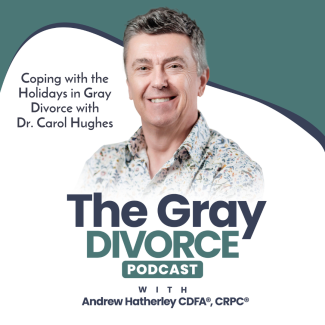
The Gray Divorce Podcast: Episode 81 Coping with the Holidays in Gray Divorce with Dr. Carol Hughes
With the holidays approaching, Andrew and Dr. Carol Hughes dive deep into how gray divorce can magnify emotional stress during what’s supposed to be “the most wonderful time of the year.” Together, they unpack strategies for coping with loneliness, maintaining family traditions, and creating new, meaningful connections.
When Holiday Cheer Meets Heartache
Holidays symbolize togetherness, belonging, and shared rituals but for those going through divorce, these celebrations can underscore feelings of loss and disconnection.
Dr. Hughes explains how divorce can fracture not only romantic partnerships but also family systems, friendships, and community ties.
Men, she notes, often struggle more with post-divorce loneliness because women traditionally act as the “kinship keepers,” maintaining social bonds that men may lose in separation.
Coping with Loneliness and Change
Dr. Hughes encourages listeners to:
- Accept reality: Recognize that loneliness doesn’t make you broken, it’s part of healing.
- Stay connected: Seek support groups through churches, community centers, or online networks.
- Give back: Volunteering helps shift focus outward, cultivating gratitude and “the Helper’s High.”
- Re-engage with life: Join clubs, rediscover hobbies, or take a trip during the holidays.
Andrew shares his own experience of finding joy through connection and service—illustrating how purpose can emerge even in seasons of grief.
Navigating Family Gatherings After Divorce
Holidays often force newly divorced families into emotionally charged situations.
Dr. Hughes outlines two main paths:
- The Ideal Divorce: Parents maintain mutual respect and work collaboratively, even sharing holiday gatherings.
- The Realistic Divorce: Parents or adult children must set firm boundaries and adjust expectations.
Adult children, she emphasizes, shouldn’t feel guilty if they choose to host separate celebrations or decline to mediate between parents. Acceptance, maturity, and healthy boundaries are key.
Creating New Traditions
Instead of clinging to the past, families can find comfort in new rituals:
- Celebrate in neutral spaces (like restaurants or vacations).
- Alternate homes or create “Friendsgiving” gatherings.
- Shift hosting duties to adult children or friends to ease emotional tension.
- Focus on gratitude and togetherness, not perfection.
The Role of Friends and New Partners
Friends can play a crucial role in supporting those experiencing their first post-divorce holiday season—simple gestures like invitations or inclusion can mean everything.
As for new significant others, Dr. Hughes advises patience and empathy. “It’s not about you,” she says. “It’s about the family’s healing.”
Key Takeaways
- Loneliness isn’t failure, it’s transition.
- Boundaries protect peace. It’s okay to say no.
- Acceptance and reality are the foundation of recovery.
- Empathy, volunteering, and gratitude foster true connection.
- Don’t go through it alone—seek support, therapy, and community.
Final Thoughts
Dr. Hughes closes with two powerful words: Acceptance and Reality.
Healing comes from acknowledging what is, not clinging to what was. By embracing change, seeking connection, and focusing on gratitude, we can rediscover meaning and joy—even in a season of loss.
Resources
- Dr. Carol Hughes: www.drcarolhughes.com | www.divorcepeacemaking.com
- Book: Home Will Never Be the Same Again by Dr. Carol Hughes

